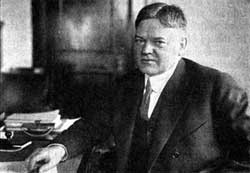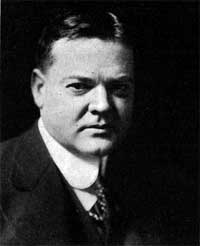Herbert Hoover, the thirty-first President of the United States (1929-33), bore the brunt of the blame for the Great Depression, which was the result of the stock market crash of 1929. Born on August 10, 1874, in West Branch, Iowa, he was orphaned at the age of eight and spent his childhood in the home of his wealthy uncle. He worked his way through Stanford University, where he studied engineering. In 1895, he graduated, married Lou Henry, and began work as a laborer in the California mines. Soon after that he took a position in Australia directing gold mining ventures. The next twenty years were primarily devoted to traveling throughout Asia, Africa, and Europe as a mining entrepreneur and, subsequently, he earned a considerable fortune.

Herbert Hoover was a passionate man who, because of his Quaker upbringing, believed in peace. He was also an author of several books, American Individualism, The Challenge to Liberty, and Memoirs. His hobbies included fishing, hiking, and reading. He had a quiet sense of humor and seldom laughed out loud.

 When World War I broke out, Hoover was in London. He organized the return of thousands of American tourists who were stranded in Europe at the time. He was appointed to head the Commission for Relief in Belgium. This was a position in which he received national attention for his humanitarian efforts. The Commission fed over 10,000,000 people during the war. In 1917 he was recalled to the United States to serve as Food Administrator (which was a special office designed for wartime purposes). It was created to promote American agricultural production and coordinate the rationing and distribution of food. President Wilson then asked Hoover to return to Europe and direct The American Relief Administration, an agency whose purpose was to relieve suffering throughout Europe. When World War I broke out, Hoover was in London. He organized the return of thousands of American tourists who were stranded in Europe at the time. He was appointed to head the Commission for Relief in Belgium. This was a position in which he received national attention for his humanitarian efforts. The Commission fed over 10,000,000 people during the war. In 1917 he was recalled to the United States to serve as Food Administrator (which was a special office designed for wartime purposes). It was created to promote American agricultural production and coordinate the rationing and distribution of food. President Wilson then asked Hoover to return to Europe and direct The American Relief Administration, an agency whose purpose was to relieve suffering throughout Europe.
In 1920 Hoover declared himself a Republican, but declined to run for President. In 1921, President Warren Harding appointed him Secretary of Commerce. He held this post until 1928 when his campaign for President began. As Secretary of Commerce, he expanded his department to promote foreign trade and standardized industry to reduce waste. During the two Presidencies he served in this position, he was nicknamed the Secretary of Domestic Affairs. He believed deeply in the self worth of individuals. Many of his beliefs were founded in his Quaker roots.
Continuing his public service as a member of President Coolidge's cabinet, Hoover pressed for the regulation of radio and utilities. He initiated construction of one of the largest dams in the world on the Colorado River. Appropriately, the Hoover Dam bears his name. Hoover was considered the natural heir to President Coolidge and won the 1928 election easily, defeating Alfred Smith by the largest number of electoral votes in history up to that time.

 Hoover was the only President besides Calvin Coolidge to be sworn into office by a former President - President Taft. Hoover believed that business people should unite and form trade associations, believed that the sharing of important information about cost, production, and distribution would expand market growth. He believed the government should support, but not control business. In 1929 when stock prices plunged and $15 billion dollars was lost, Hoover, sincerely hoping that businessmen and voluntary agreements could restart the economy, told the public that the depression was temporary and prosperity was just around the corner. The next year, however, brought drought, massive unemployment, and great suffering. Still he passionately clung to the notion that the citizens would rally and by their individual cooperative actions would cure the ills of the economy without the help of government intervention. Hoover was the only President besides Calvin Coolidge to be sworn into office by a former President - President Taft. Hoover believed that business people should unite and form trade associations, believed that the sharing of important information about cost, production, and distribution would expand market growth. He believed the government should support, but not control business. In 1929 when stock prices plunged and $15 billion dollars was lost, Hoover, sincerely hoping that businessmen and voluntary agreements could restart the economy, told the public that the depression was temporary and prosperity was just around the corner. The next year, however, brought drought, massive unemployment, and great suffering. Still he passionately clung to the notion that the citizens would rally and by their individual cooperative actions would cure the ills of the economy without the help of government intervention.
Hoover was the first President to use the authority of the Federal Government to combat a depression, although he did so in a very limited way. In 1932 he sponsored the Reconstruction Finance Corporation to use assets of institutional investment to give loans to the troubled business community. He still refused to assist farmers or to pay unemployment compensation, insisting such aid should come at the local level. When Veterans of World War I marched on Washington to force payment of bonus guarantees, Hoover sent the Army under General Douglas McArthur to remove the "Bonus Army" from its encampment. Cardboard shantytowns called "Hoovervilles" sprang up across the country. Rabbits were called "Hoover Hogs," and the migration from the "Dust Bowl" of the plains began.

As the election of 1932 neared, the result was a foregone conclusion. In 1932 Franklin Roosevelt defeated Hoover by the greatest margin of electoral votes in the nation's history up to that time. Hoover remained the spokesperson for the Republican Party and continued to maintain that individuals should not look to the government to cure them of their ills. After World War II, he picked up in Europe where he had left off after the First World War. He coordinated the European Food Program (1946-47) and served on President Eisenhower's Commission on the Re-Organization of the Executive Branch of Government (1953-55). He gave many recommendations to the committee on how to make the government more efficient and make the President more accountable to Congress and the people. Many of these ideas are still used today as the standards of the Republican Party. Herbert Hoover was a man of great ethics and principle, but unfortunately, he is remembered as the President who brought the United States' economy to ruin. He died in New York City on October 20, 1964, at the age of ninety.
|

